Manuscript Collection
Family and personal papers, business and church records, corporate and legal documents, diaries, and journals are among the items in our manuscript collection.
The material in the collection dates from the late-17th to the mid-20th century, with a strong concentration of items from the mid-19th to the early-20th century.
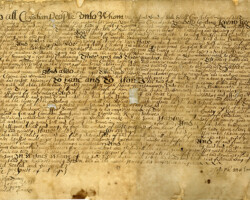
The Mason and Butterworth families were early settlers in Swansea; their descendants became leading citizens in nearby Fall River, Massachusetts.
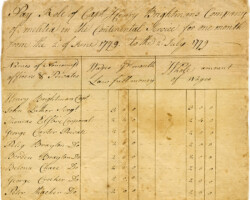
Serving in the company was Boston Durfee, a “Negroman”; listed with the rank of Private, he earned the same wage as his fellow soldiers.
On November 16, 1788, in Freetown, Massachusetts, Boston Durfee, an African-American patriot, married Sarah Slocum ”alias Dick”; evidenced by his surname, he was likely a former slave.
The slave trade between New England and the West Indies was established in the 17th century, with Newport, Rhode Island, as its chief marketplace. Some early residents in the area that is now Fall River invested in slaves, using them as farmhands and domestic servants. Thomas Durfee (1643-1712), the first settler of that surname in New England, owned a slave named Jack, bequeathing him to his wife, Deliverance (Hall) Tripp Durfee (?-1721) in his will, which was proved on July 14, 1712: “To wife, Deliverance, a negro called Jack, for life, and at her death the value of said negro, equally, to two daughters.” It was a common practice for slaves to adopt the surname of their owners, hence Jack was known as Jack Durfee. Wills and estate inventories of other early residents in the area that is now Fall River list slaves, bequeathed to heirs of the deceased along with other property. Slavery was abolished in Massachusetts in 1783.
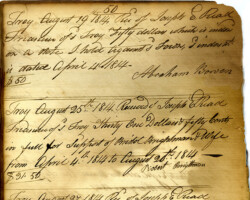
Fall River was called Troy from June 1, 1804, to February 12, 1834. Early town records are rare, due to several fires during the 19th century; the charred binding and water damage to this ledger is evidence of one of those conflagrations.
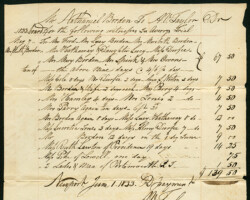
The body of Sarah Maria Cornell (1803-1832), a “mill girl” employed at the Fall River Manufactory, was discovered on December 21, 1832 hanging in a stack-yard on the farm of John Durfee in Tiverton, Rhode Island (now Fall River, Massachusetts); an autopsy revealed that the victim was pregnant. The Reverend Ephraim Kingsbury Avery (1799-1869), a Methodist minister, was accused of the crime due to incriminating evidence left by the victim. Following a sensational trial, considered a cause célèbre of the era, he was acquitted on June 2, 1833. The perpetrator of the crime was never brought to justice.
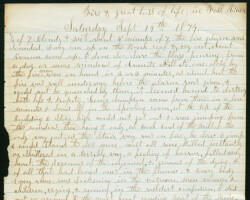
The diaries cover the years 1858 – 1895 and offer a fascinating glimpse into the day-to-day activities of a busy, middle-class working woman during Fall River’s most prosperous period.
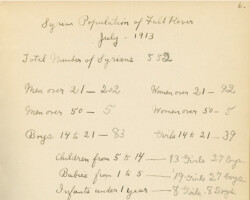
This unpublished journal of detailed statistical and biographical accounts was compiled by Alice Brayton for use in the Social Services Department of the Union Hospital in Fall River, Massachusetts. It contains important historical material about an ethnic group in Fall River that has yet to be thoroughly researched.
